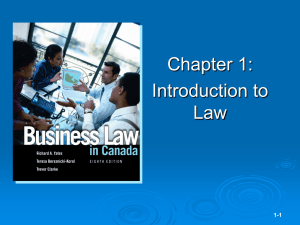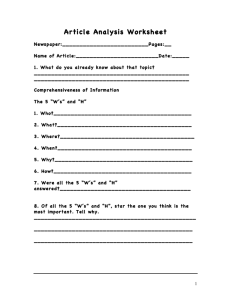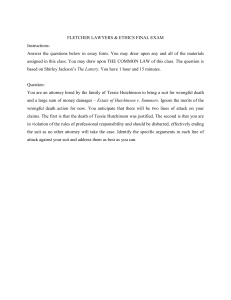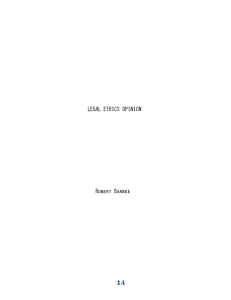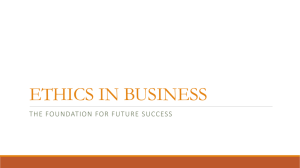Whistleblowing: Attorney's Duty to Report Unethical Conduct When
advertisement
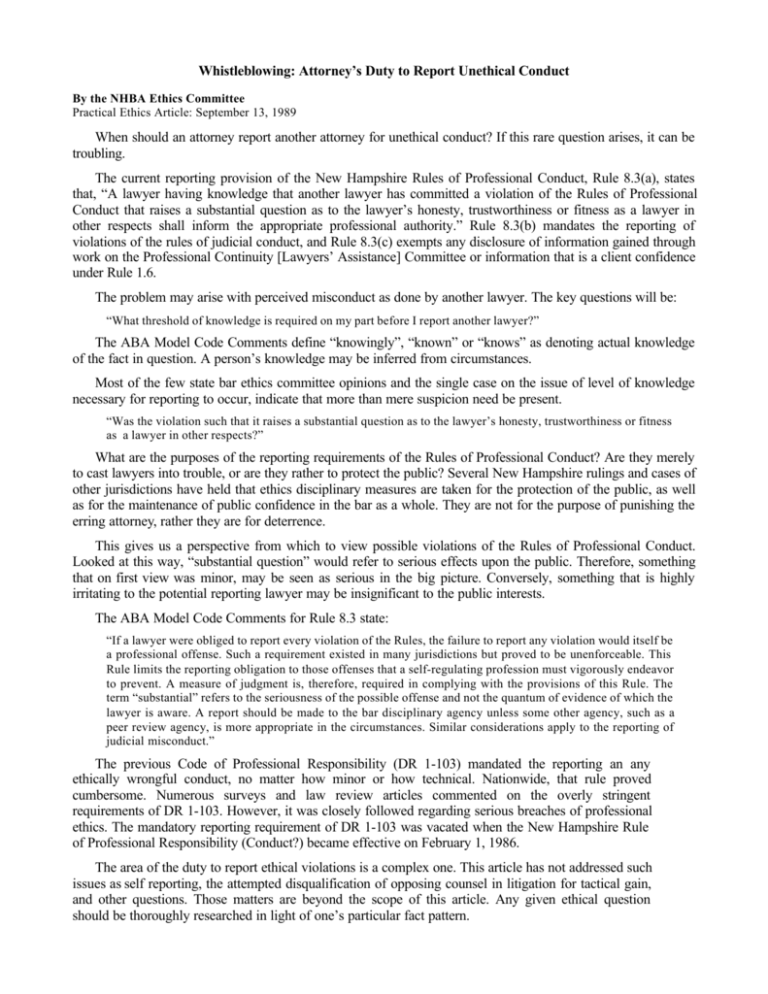
Whistleblowing: Attorney’s Duty to Report Unethical Conduct By the NHBA Ethics Committee Practical Ethics Article: September 13, 1989 When should an attorney report another attorney for unethical conduct? If this rare question arises, it can be troubling. The current reporting provision of the New Hampshire Rules of Professional Conduct, Rule 8.3(a), states that, “A lawyer having knowledge that another lawyer has committed a violation of the Rules of Professional Conduct that raises a substantial question as to the lawyer’s honesty, trustworthiness or fitness as a lawyer in other respects shall inform the appropriate professional authority.” Rule 8.3(b) mandates the reporting of violations of the rules of judicial conduct, and Rule 8.3(c) exempts any disclosure of information gained through work on the Professional Continuity [Lawyers’ Assistance] Committee or information that is a client confidence under Rule 1.6. The problem may arise with perceived misconduct as done by another lawyer. The key questions will be: “What threshold of knowledge is required on my part before I report another lawyer?” The ABA Model Code Comments define “knowingly”, “known” or “knows” as denoting actual knowledge of the fact in question. A person’s knowledge may be inferred from circumstances. Most of the few state bar ethics committee opinions and the single case on the issue of level of knowledge necessary for reporting to occur, indicate that more than mere suspicion need be present. “Was the violation such that it raises a substantial question as to the lawyer’s honesty, trustworthiness or fitness as a lawyer in other respects?” What are the purposes of the reporting requirements of the Rules of Professional Conduct? Are they merely to cast lawyers into trouble, or are they rather to protect the public? Several New Hampshire rulings and cases of other jurisdictions have held that ethics disciplinary measures are taken for the protection of the public, as well as for the maintenance of public confidence in the bar as a whole. They are not for the purpose of punishing the erring attorney, rather they are for deterrence. This gives us a perspective from which to view possible violations of the Rules of Professional Conduct. Looked at this way, “substantial question” would refer to serious effects upon the public. Therefore, something that on first view was minor, may be seen as serious in the big picture. Conversely, something that is highly irritating to the potential reporting lawyer may be insignificant to the public interests. The ABA Model Code Comments for Rule 8.3 state: “If a lawyer were obliged to report every violation of the Rules, the failure to report any violation would itself be a professional offense. Such a requirement existed in many jurisdictions but proved to be unenforceable. This Rule limits the reporting obligation to those offenses that a self-regulating profession must vigorously endeavor to prevent. A measure of judgment is, therefore, required in complying with the provisions of this Rule. The term “substantial” refers to the seriousness of the possible offense and not the quantum of evidence of which the lawyer is aware. A report should be made to the bar disciplinary agency unless some other agency, such as a peer review agency, is more appropriate in the circumstances. Similar considerations apply to the reporting of judicial misconduct.” The previous Code of Professional Responsibility (DR 1-103) mandated the reporting an any ethically wrongful conduct, no matter how minor or how technical. Nationwide, that rule proved cumbersome. Numerous surveys and law review articles commented on the overly stringent requirements of DR 1-103. However, it was closely followed regarding serious breaches of professional ethics. The mandatory reporting requirement of DR 1-103 was vacated when the New Hampshire Rule of Professional Responsibility (Conduct?) became effective on February 1, 1986. The area of the duty to report ethical violations is a complex one. This article has not addressed such issues as self reporting, the attempted disqualification of opposing counsel in litigation for tactical gain, and other questions. Those matters are beyond the scope of this article. Any given ethical question should be thoroughly researched in light of one’s particular fact pattern.



